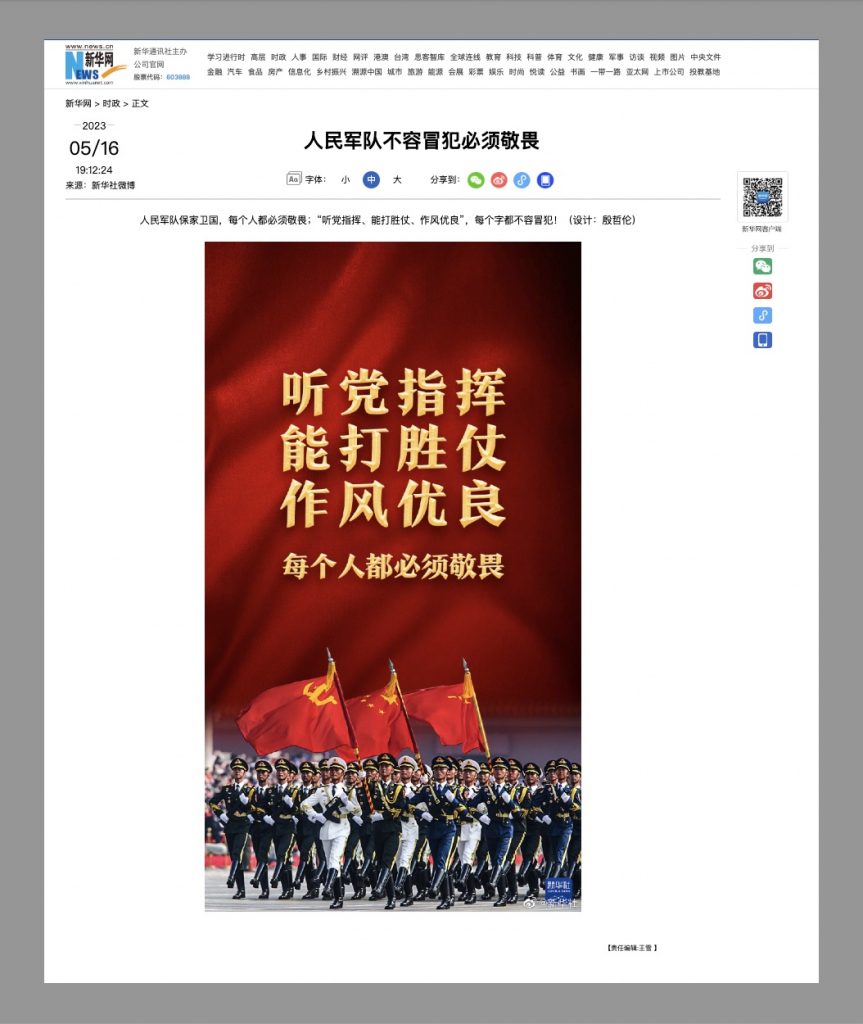
During a meeting with top military officials 10 years ago, Chinese leader Xi Jinping vowed to mold the People’s Liberation Army into a world-class fighting force “able to win battles, with first-rate style” (能打胜仗, 作风优良). Apparently, the general secretary was not joking.
News broke yesterday that Li Haoshi (李昊石), a Chinese stand-up comedian who goes by the nickname “House,” has been suspended indefinitely after a joke during a performance on May 13 alluded to the above slogan — which has frequently been used by the People’s Liberation Army and Chinese state media in recent years to signal Xi Jinping’s resolve in reaching “the goal of a powerful military” (强军目标).
The phrase “able to win battles, with first-rate style” is part of a full propaganda phrase that begins with the injunction to “listen to the Party,” emphasizing the leadership of the military by the Chinese Communist Party, an unquestionable tenet of regime security. With its allusion to “first-rate style,” the phrase invokes for some the image of a fighting force that is buttoned-up and in tip-top shape, rigidly goose-stepping toward greatness.

During his performance, however, Li Haoshi apparently committed the sin of turning this image into a parody. He quipped to his audience that he had adopted two stray dogs that showed great determination whenever a squirrel crossed their path. “When these two dogs chase a squirrel, they launch after it like artillery shells,” Li said. “Usually, you see dogs and you think how cute they are, and your heart melts . . . . When I see these two dogs, my heart flashes with the words: ‘Able to win battles, with first-rate style.’”
In a strongly-worded response yesterday amid a barrage of attacks from state-run media accounts on the internet, the official Xinhua News Agency did not mince words: “The people’s army protects the country, and must have the reverence of all. ‘Listening to the Party, able to win battles, with first-rate style.’ Not a word [of this phrase] must be derided!”
The incident has reportedly prompted an official investigation into Li Haoshi’s employer, Shanghai Xiaoguo Culture Media (上海笑果文化傳媒有限公司), which has already said publicly that it has “severely criticized” (严肃批评) the comedian. According to Caixin Global, the Li Haoshi incident has “sparked an online debate about the boundaries of talk show jokes in China.”
But defining the boundaries of funny and not-funny is likely to prove a difficult, if not impossible, task in a political culture already flooded with bluster and hyperbole that can, with the slightest tilt of the head, come off as hilariously disjointed from real life.
High-Level Black, Low-Level Red
The “bit” in comedy — as stand-up performers know only too well — is a comedic take on reality. And reality in Xi Jinping’s “New Era” has become so drenched in the viscid syrup of seriousness that it can be a real challenge to take seriously. It’s a problem endemic to seriousness: that upon reaching its upper limits, it tends to descend rapidly into farce.
Somewhere beneath its mask of seriousness, this is a lesson the Chinese Communist Party recognizes only too painfully.
In recent years, the terms “high-level black” (高级黑) and “low-level red” (低级红) have focused the CCP‘s anxiety over its insistence on political and ideological seriousness on the one hand, and its inability to police and ensure the authenticity of that seriousness on the other. The first term, gaojihei, which is not unlike the proverbial “smile that hides a dagger” (笑里藏刀), refers to the act of using humorous language to criticize and satirize. It can often be used to describe extreme expressions of praise and obedience that use the Party’s own overworked discourse to surreptitiously signal criticism.
The second term, dijihong, refers to the other end of the spectrum — the cheap expression of obedience, pro-Party feeling, or nationalism that, while perhaps genuine, becomes a public embarrassment. This phrase became popular in November 2018, following an incident in which long-distance runner He Yinli (何引丽) was interrupted during the last stage of the Suzhou marathon by a volunteer trying to force a national flag into her hands. As a result, He fell back in the race, which drew scorn from internet users who felt this was a stupid and self-defeating display of nationalism.

So sensitive is the Chinese Communist Party not just to criticism but to the predations of overwrought praise that in February 2019 it released an opinion on “strengthening political construction” that was the first high-level official document to include “high-level black” and “low-level red.” The document dealt with the need to safeguard the seriousness of the “Two Safeguards” (两个维护), a buzzword that refers to the need to 1) reinforce the rule of Xi Jinping, and 2) reinforce the dominance of his guiding ideology.
The 2019 document was not at all kidding when it said: “[We] must with correct understanding and correct actions resolutely enact the ‘Two Safeguards,’ firmly preventing and correcting all erroneous statements that diverge from the ‘Two Safeguards,’ and [we] must not allow any form of ‘low-level red’ or ‘high-level black,’ permitting no form of two-faced outer devotion and internal opposition toward the Party’s Central Committee, any double-dealing or ‘false reverence.’”
As the Li Haoshi incident demonstrates, China’s highly sensitive political environment has very real implications for journalists, writers, performers, and ordinary citizens (to say nothing of Party officials themselves.) Between the perilous sincerity of “low-level red” and the treacherous pretense of “high-level black” there lies a minefield of language unfolding in reality. Potential crimes are a matter of perception, weighed by the risk psychology of China’s leadership and its media attack dogs — whizzing like artillery shells after the squirrels of disgrace.
It’s a problem endemic to seriousness: that upon reaching its upper limits, it tends to descend rapidly into farce.
China’s state media have put on a stern face this week over the Li Haoshi incident, letting the world know that the phrase, “Listening to the Party, able to win battles, with first-rate style,” is not to be taken lightly. Since Xi first mentioned the phrase a decade ago, it has been used faithfully within the PLA to focus and re-focus China’s resolve to build world-class armed forces.
How, we may wonder, has the PLA fared with the line between the serious and the ridiculous?
Many examples to add to the ongoing online debate about boundaries might be found in the PLA’s own use of the phrase, including an over-the-top PLA-produced musical, and a cheesy PLA comic strip. But we leave you with a personal favorite — a PLA-produced illustration that appeared on the military’s official website, 81.cn, on August 1, 2016, marking its 89th anniversary.

The illustration depicts musical notes aloft on the winds with the seagulls — or are those doves of peace? — as a sailor extends an open hand. A soldier at the center brandishes his AK-56 rifle, the bayonet attached, as the words “Listening to the Party, able to win battles, with first-rate style” fly over his head, in yellow characters across the five-star flag.
But it’s the final flourish that really hammers home the full dignity of the phrase, and the profound import of this talk of “first-rate style.” On the right side of the illustration, an air force pilot plays gleefully with a toy airplane, even making a flying motion with his hand.
Who says propaganda can’t be serious fun?




















